No neutral monsters - Taking Sides - Battle Mage Secrets - Splinterlands[ENG-PT]
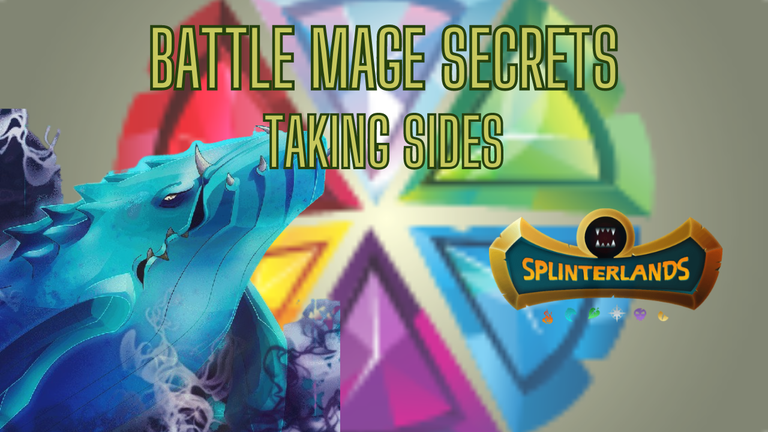
Banner made by me, using Canva
All the images from the banner are from @splinterlands
English
Introduction
The Neutral Splinter is one of the most popular in the game because you can use it with any other card, regardless of which one it is, since they have no summoner restrictions. That's why, if you want to put together a deck of cards, be it big or small, cards of this type will be present.
However, there is one specific moment when it won't be possible to play with them, and that's when the Taking Sides ruleset comes into play.

Taking Sides ruleset icon
This is the kind of ruleset that alone won't let you know exactly what strategy to put together, because it limits the number of cards in general, not specifically.
This means that whichever splinter you select, you'll have monsters of all kinds at your disposal, so all that remains is to analyze the other rules that will come along with it, if they do.

Battle
In the battle I'm about to present, there were only two splinters available: Water and Dragon. And, of course, you couldn't use Neutrals, which made the match very limited in terms of strategy.

The other rulesets that were present meant that no attack could be missed, as well as allowing the use of a Gladiator on the field.


Aim True and Are You Not Entertained? rulesets. The first make impossible to miss an attack and the second allows the use of one Gladiator in the battle
The amount of mana available was also relevant. There were 37 points that could be well distributed to the whole team.
So, I decided to use a strategy that has become very common and efficient for this particular splinter.
It consists of using all the monsters with Opportunity, which attacks the one with the lowest amount of life. In this way, the weakest are eliminated quickly and first, leaving the strongest alone on the field, making it difficult for the opposing team to win.
I've chosen the three strongest available for this, Deeplurker, Isgald Vorst and Kulu Mastermind.

In front, I put Baakjira. I was in doubt between him and Noa the Just, because the former increases my team's attributes and is much better at holding off attacks, especially magical ones, while the latter is more of an offensive support, because it removes 2 armor points from the entire opposing team, and ends up not being very good at holding off magical attacks. So I ended up opting for the safer option.
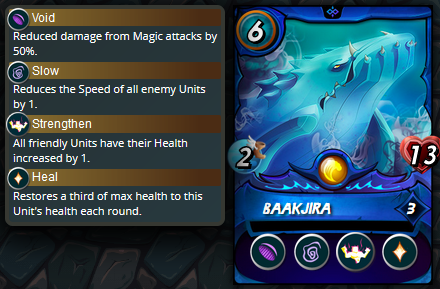
Right behind it, I put the Merdaali Guardian, because as well as healing the tanker, it restores 2 armor points to any of the monsters that are on the field and take the most damage.
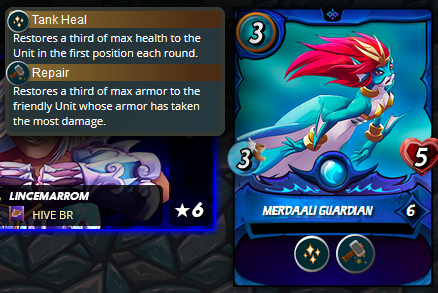
And finally, I put in the Kulu Swimhunter to deal a little extra damage.
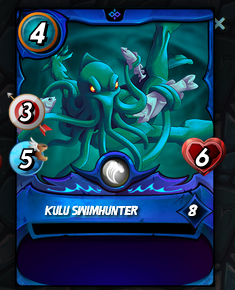
And the teams are showed each other...
In the first round, my team manages to eliminate an opponent's monster, while I don't have any casualties.
After the end of the second round, two more of the enemy's monsters are eliminated. This shows the effectiveness of this strategy, in focusing on the weakest first, to leave the strongest last, but alone, decreasing their chances of winning, since they will have to deal with several attacks being directed at them.
I end up winning at the end of the fifth round, losing 2 of my monsters, and the Deeplurker alive with only 1 life point. Still, there were 3 others that were intact, without having taken a single point of damage.
Click here to watch the full battle!

Conclusion
Sometimes it's better to be defensively cautious than to try to be more offensive. The fact that I opted for this when choosing the tanker made winning this battle much easier. As you can see, he was in a lot of demand, suffering several attacks, and the heals added to the large amount of life meant that he held out long enough for my attackers to finish off the opposing team.
If I had opted for the more offensive option, in this case Noa The Just, I could have suffered a lot and even lost the battle, because in addition to the low amount of life, the Aim true battle rule didn't favor its use as much.
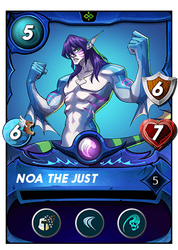
That's why it's not enough to analyze just one rule, as in the case of Taking Sides, which has no impact on the cards, only limits a certain amount, it's necessary to analyze all the others that are present so that the best possible strategy can be built.
All the images are from @Splinterlands
Divider By: @freeztag
Are you not playing Splinterlands yet? Click HERE and play with me!

Português
Introdução
O Splinter Neutro, é um dos mais visados no jogo, pois você pode usá-lo com qualquer outro, independente de qual seja, já que eles não possuem restrição de invocador. Por isso, para quem deseja montar um deck de cartas, seja ele grande ou pequeno, as cartas desse tipo irão se fazer presentes.
Porém, há um momento em específico que não será possível jogar com ele, que é quando a regra de batalha Taking Sides se faz presente.

Ícone da regra de batalha Taking Sides
Esse é aquele tipo de regra, que sozinho não irá fazer com que você saiba exatamente qual estratégia montar, pois está limitando uma quantidade de cartas de modo geral, e não especificamente.
Isso quer dizer que qualquer splinter que você selecionar, você terá a disposição monstros de todos os tipos, então o que resta é analisar as outras regras que irão vir em conjunto, caso venham.

Batalha
Na batalha que irei apresentar, só haviam dois splinters disponíveis: Água e Dragão. Além é claro, de não poder usar Neutros, o que deixou a partida bastante limitada em questão de estratégia.

As outras regras que estavam presentes, faziam com que nenhum ataque causasse erro, além de permitir o uso de um Gladiador em campo.


Regras de batalha Aim True and Are You Not Entertained? A primeira torna impossível de errar um ataque, enquanto a segunda permite o uso de um gladiador na batalha
A quantidade de mana disponível era relevante também. Eram 37 pontos que poderiam ser bem distribuídos para todo o time.
Então, eu decidi fazer uma estratégia que se tornou muito comum e eficiente para este splinter em específico.
Ela consiste em usar todos os monstros com Opportunity, que atacam o que possuir a menor quantidade de vida. Desse modo, os mais fracos são eliminados por rapidamente e por primeiro, deixando os mais fortes sozinhos em campo, dificultando a chance de vitória do time adversário.
Escolhi os 3 mais fortes disponíveis para isso, Deeplurker, Isgald Vorst e Kulu Mastermind.

Na frente, eu coloquei o Baakjira. Eu estava em dúvida entre ele ou o Noa the Just, pois o primeiro aumenta os atributos do meu time, além de ser muito melhor para segurar ataques, principalmente mágicos, enquanto o último é mais uma espécie de suporte ofensivo, pois remove 2 pontos de armadura de todo o time adversário, e acaba não sendo muito bom para segurar ataques mágicos. Acabei então optando pela opção mais segura.

Logo atrás dele, eu coloquei a Merdaali Guardian, pois além dela curar o tanker, ela restaura 2 pontos de armadura de qualquer um dos monstros que estiver em campo e sofrer o maior dano.

E por fim, coloquei o Kulu Swimhunter para causar um pouco de dano a mais.

E os times são mostrados um ao outro...
Na primeira rodada, meu time consegue eliminar um monstro adversário, enquanto eu não tive nenhuma baixa.
Após o final da segunda rodada, mais dois monstros do inimigo são eliminados. Isso mostra a eficácia dessa estratégia, em focar os mais fracos primeiro, para deixar os mais fortes em último, porém sozinhos, diminuindo as chances de conseguirem vencer, já que terão que lidar com diversos ataques sendo direcionados até eles.
Eu acabo vencendo no final da quinta rodada, perdendo 2 de meus monstros, e o Deeplurker vivo com apenas 1 ponto de vida. Ainda assim, haviam outros 3 que estavam intactos, sem ter levado um ponto de dano sequer.
Clique aqui para ver a batalha completa!

Conclusão
Ás vezes é melhor se prevenir defensivamente, do que buscar ser mais ofensivo. O fato de eu ter optado por isso na escolha do tanker, fez com que a vitória nessa batalha fosse muito mais tranquila. Como pode ser observado, ele foi bastante demandado, sofrendo diversos ataques, e as curas somada a grande quantidade de vida, fez com que ele segurasse tempo suficiente para que os meus atacantes acabassem com a equipe adversária.
Caso eu tivesse optado pela opção mais ofensiva, no caso o Noa The Just, eu poderia ter sofrido bastante e até perdido a batalha, pois além da baixa quantidade de vida, a regra de batalha Aim true não favorecia tanto o seu uso.

Por isso, não basta apenas analisar uma regra só, como no caso da Taking Sides, que não causa impacto nas cartas, apenas limita uma determinada quantidade, é necessário analisar todas as outras que se fazem presentes para que possa ser construída a melhor estratégia possível.
Todas as imagens são do: @Splinterlands
Divisor do: @freeztag
Não joga Splinterlands ainda? Clique AQUI e venha jogar comigo!

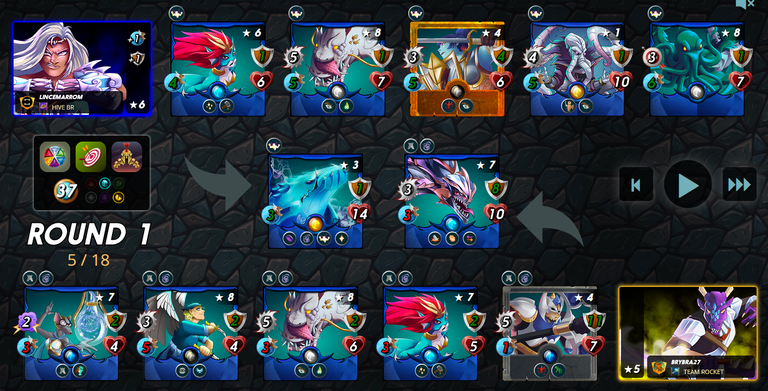
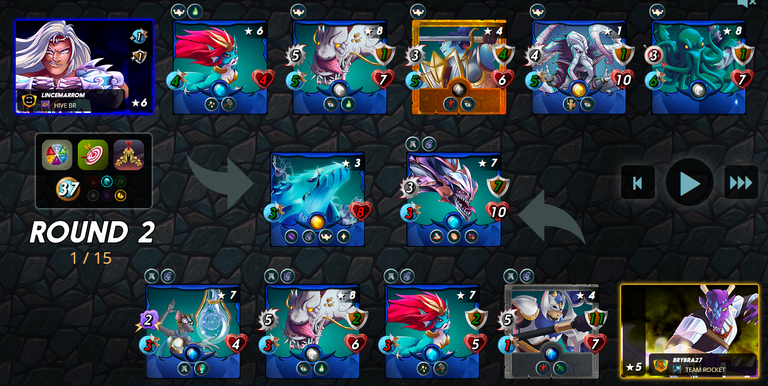
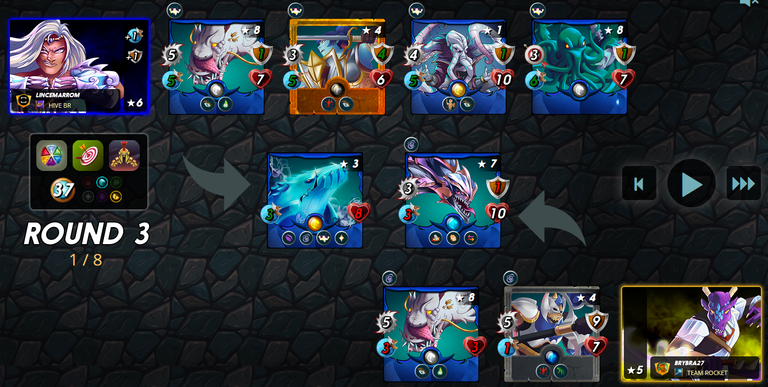
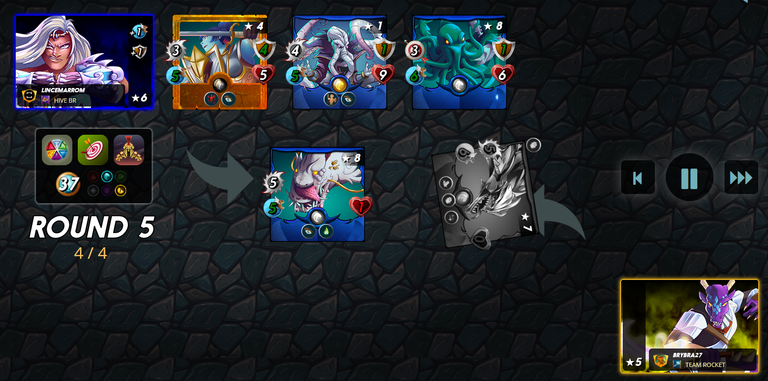
Obrigado por promover a comunidade Hive-BR em suas postagens.
Vamos seguir fortalecendo a Hive
Your post was manually curated by @Shiftrox.
Delegate your HP to the hive-br.voter account and earn Hive daily!
🔹 Follow our Curation Trail and don't miss voting! 🔹
Obrigado por ajudar a crescer a nossa comunidade Portuguesa no HIVE
Support Splinterlands by Submitting a positive review about Splinterlands on Gam3s & also nominate Splinterlands for the People's Choice Awards on Gam3s. Don't forgot to take screenshot & save those after you finish all those task, there will reward in future 😉 .Thank you
Thanks!
Thanks for sharing! - @rehan12
